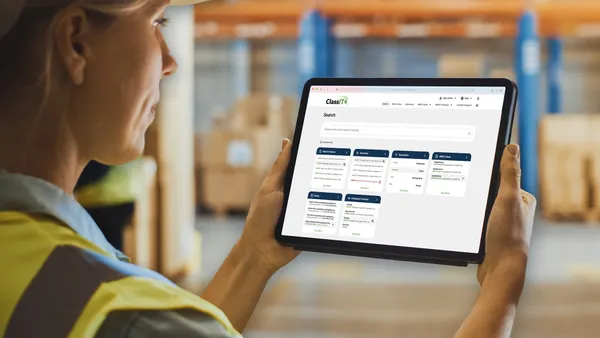Editor's Note: To see all coverage of CSCMP Edge 2017, please click here.
Dive Brief:
- Several sessions at the annual Council of Supply Chain Management Professionals (CSCMP) Edge offered conflicting views on data collection and usage: some speakers and companies think supply chain professionals need more data, while others say they have enough and just need new tools for processing it.
- In IBM's presentation on Watson and blockchain, the company said supply chains don't have enough data and that they need more. But according to a presentation from JDA Software, everyone has plenty of data; what's needed is the right tech for handling and understanding what it means.
- One CSCMP session, titled "Coping with TMD (Too Much Data)," underscored this tension about the right amount and how to manage it.
Dive Insight:
When evaluating the opposing views, the data problem becomes a company-specific question. Different companies have different needs, and while some may be have too much or not enough data, others just need new tools to clean the data and make it comprehensible.
Because the industry is undergoing such rapid change, every company's approach to supply chain data will be different.
"The supply chain is a grid, it's no longer linear," said Ken Bologna, solutions advisor for JDA. "Every path is situational."
But many companies still treat their supply chains as if they're linear, he said, which is why they need better tools for streamlining and collecting their data and making it available to the right people along the supply chain. Bologna believes companies need to develop "simple and intuitive" technology for their supply chains that integrate all the moving parts. Right now, there are many different tech applications that each handle just one aspect of a supply chain, and that needs to change.
"As an industry, we need to start connecting these applications," he said.
For companies to create the best supply chains, they need to be better about how they handle their data and make it accessible to others.
IBM agrees with this premise, as the company announced in a video presentation, "Companies with the best supply chains ultimately win." However, IBM argues that companies actually need more data.
"You may feel like you're drowning in data, but I'm telling you to go get more," said Shari Diaz, ecosystem and innovation leader for IBM Watson Supply Chain.
Even though these two perspectives conflict, together they reveal something about the industry at large: supply chain professionals are captivated by data — whether they have enough, too much or too little, and whether they're handling and cleaning it correctly. In a digitized age when so much information is available at every individual's fingertips, companies are worrying about whether they're giving their clients, customers and suppliers enough data or the right data.
Because retailers have struggled with implementing omnichannel methods and data synchronization, it's unsurprising that supply chain professionals are taking the matter so seriously, even if they disagree on the best course of action.













